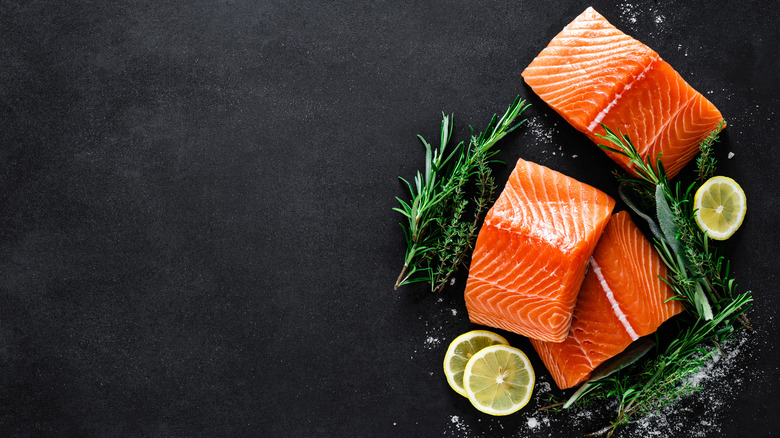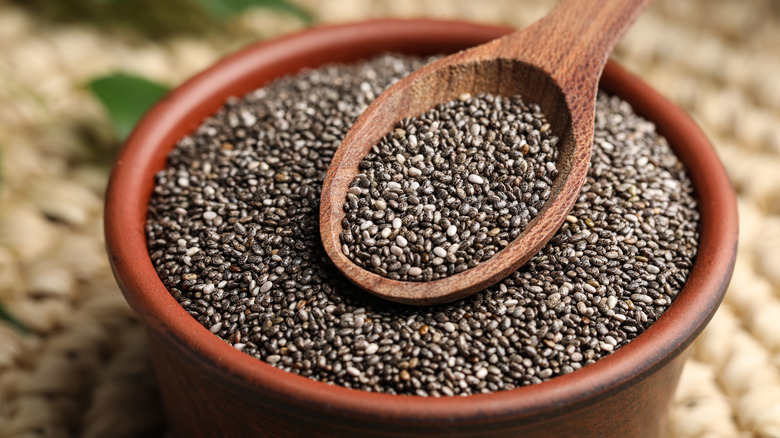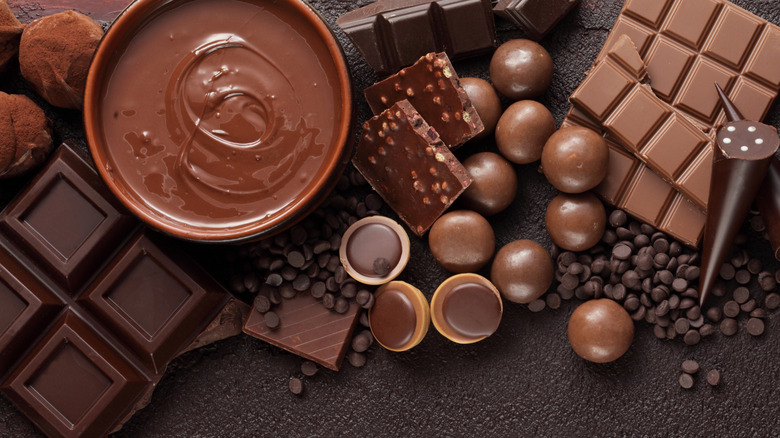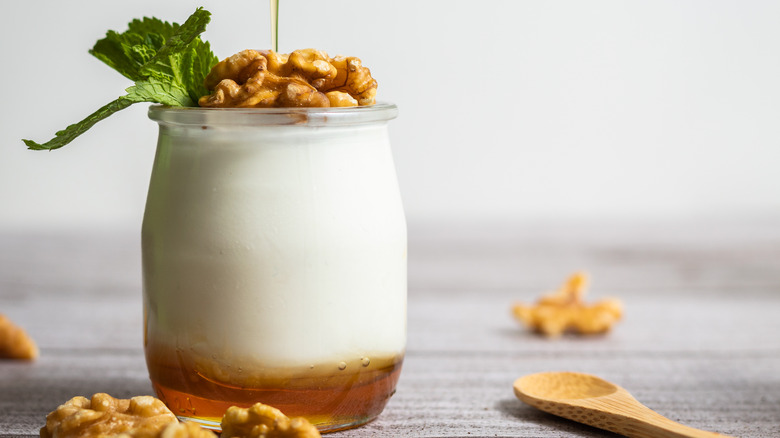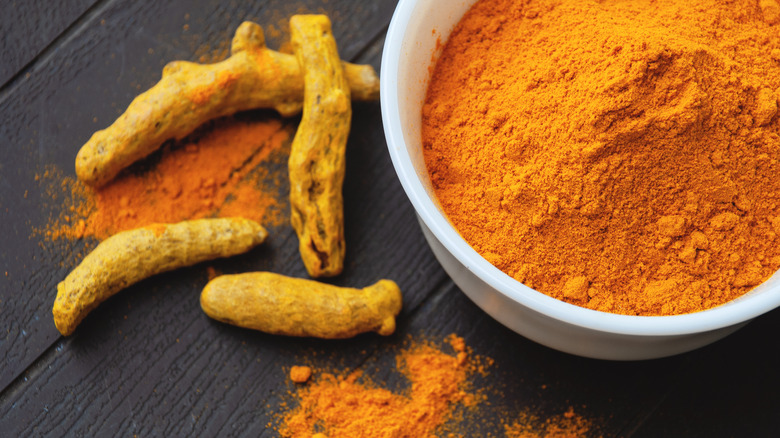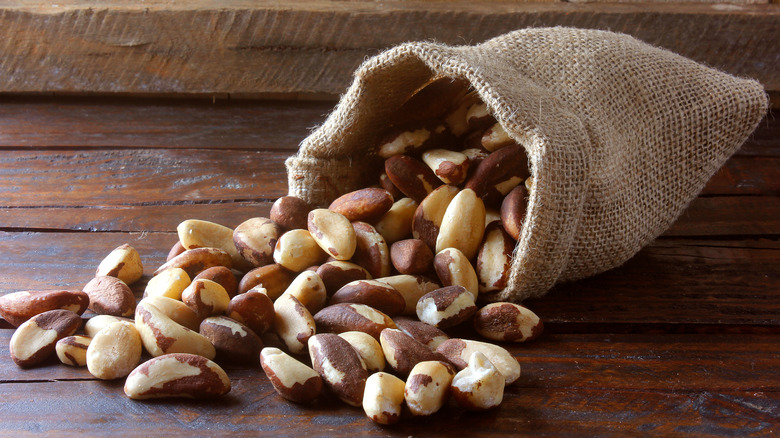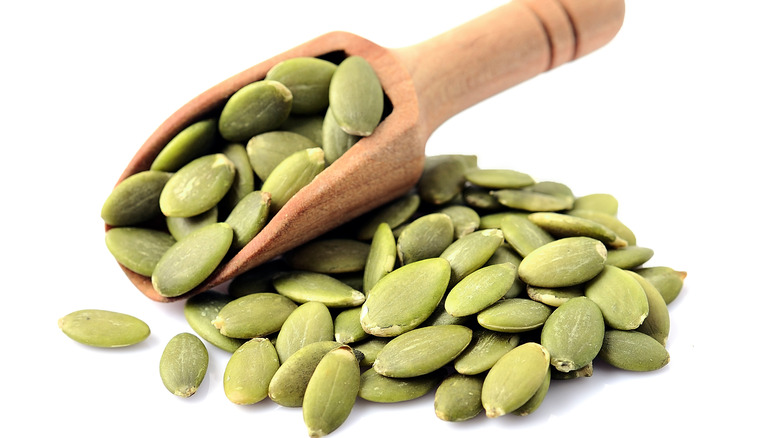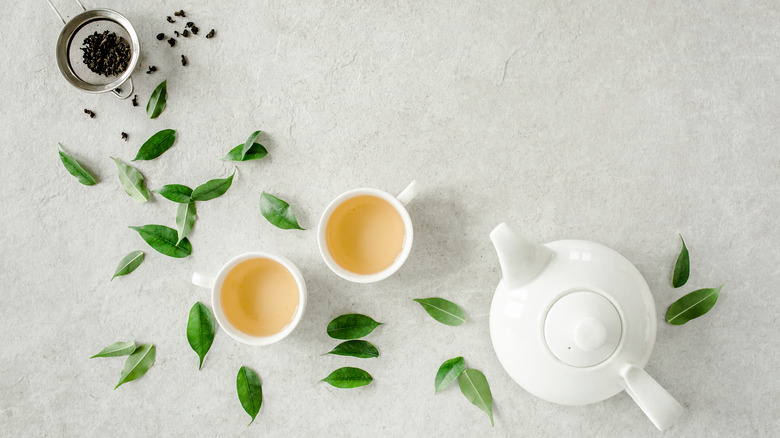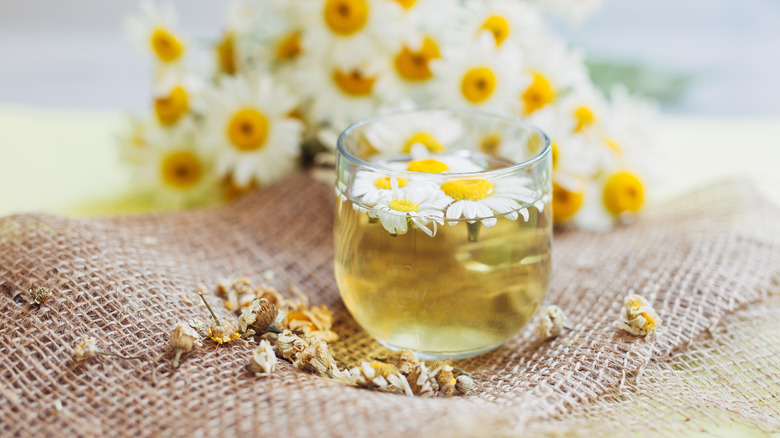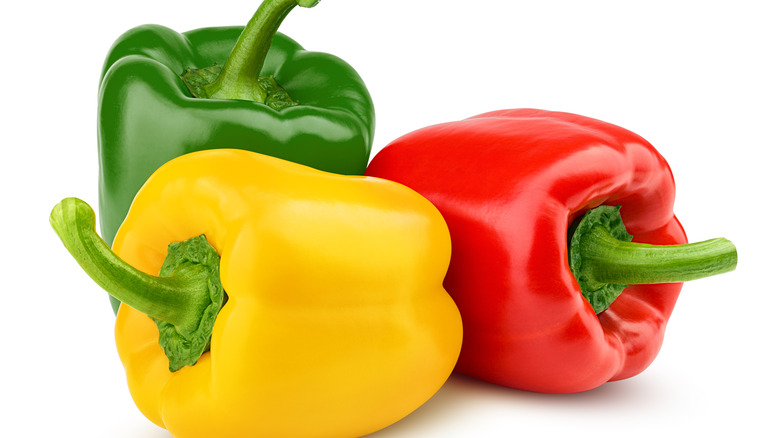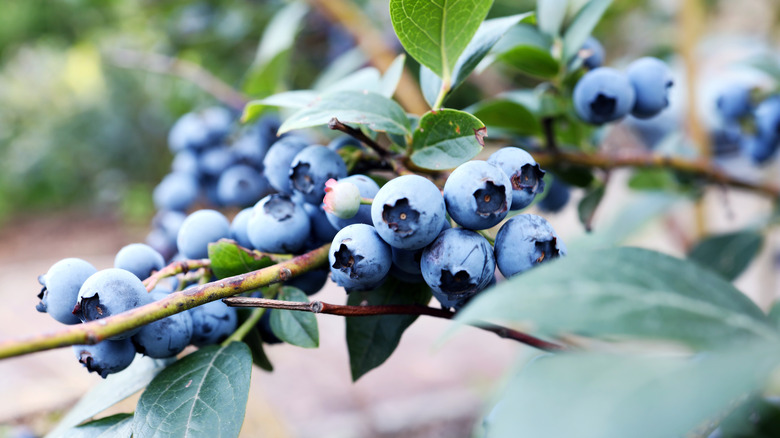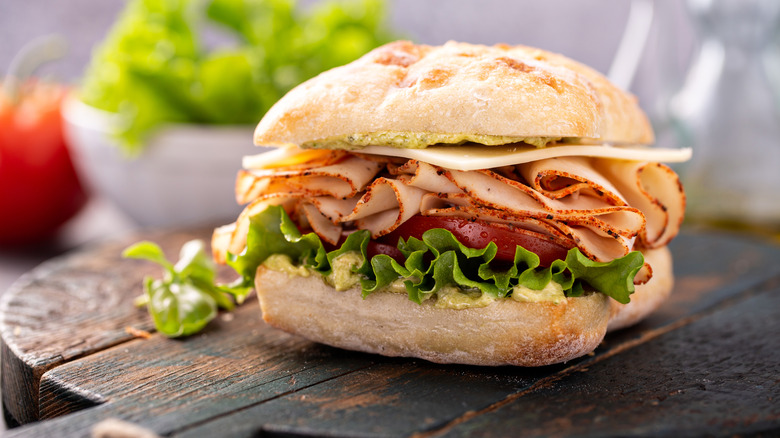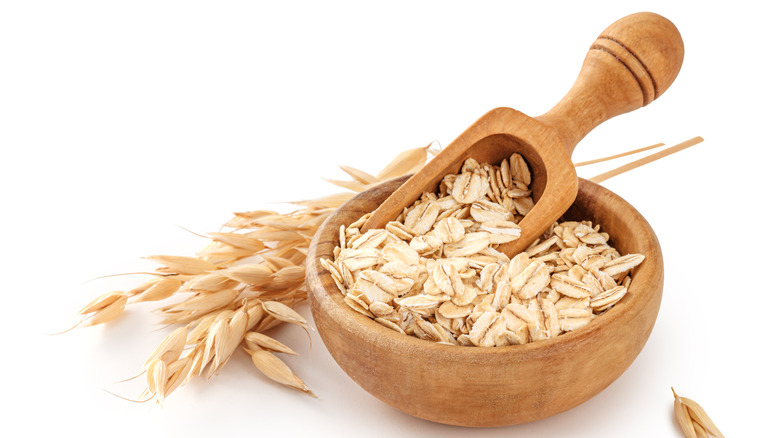14 Foods That Can Help Reduce Anxiety
Anxiety is a mental health condition that affects nearly 8% of the global population (via Healthline). While the cultural rhetoric surrounding coping with anxiety is varied, many people are awakening to the idea of confronting anxiety from a holistic perspective in tandem with medical treatment approaches. Researchers often tout the benefits of breathing exercises and physical exercise as means to help cope with the myriad and oft-debilitating symptoms of chronic anxiety. It also turns out that many foods, even some that a lot of us consume on a day-to-day basis, can have soothing effects.
Many of the foods that are regarded as "anti-anxiety" earned this label because of the effects they can have on our brains and cognition. Many of these foods contain compounds that can help boost our brain function and thus decrease the symptoms of anxiety. Anxiety is a mental health condition and, in many cases, requires medical intervention to placate. If you are struggling with anxiety, check in with your doctor or another qualified mental health practitioner first, and then with their consultation, you may want to attempt to incorporate the following foods into your diet. The brain-boosting benefits might help you find a healthy and sustainable way to coexist with your anxiety.
Eggs
Interestingly enough, eggs have compounds in them that make them great for helping to reduce anxiety — though this is not particularly surprising since eggs are one of the most nutrient-dense foods on the planet (via WebMD). The main reason that eggs can aid in anxiety reduction is because they contain an amino acid called "tryptophan" (per Medline Plus). It is an essential amino acid, meaning that it is a protein building-block that we need to consume via food sources.
Tryptophan can help create serotonin, which influences everything from our mood to our sleep and beyond. Serotonin is know to boost your brain function, which can help relieve some symptoms of anxiety. The liver can also utilize tryptophan as a means to create vitamin B3 given that the conditions within your body support this. If so, this is beneficial because it can help with metabolic function and DNA production, according to Medline Plus.
Fatty fish
If you are interested in achieving optimal health, it is likely that you are familiar with the many great benefits that consuming fatty fish can have within our bodies. And when it comes to reducing symptoms of anxiety, fatty fish prevails once again. The term "fatty fish" includes salmon, herring, mackerel, trout, and more. While fish can contain both omega-3 and omega-6 fatty acids, omega-3 fatty acids are of more interest when it comes to reducing anxiety. In fact, some research has shown that the over-consumption of omega-6 fatty acids may increase the likelihood of developing a mood disorder.
Omega-3 fatty acids, however, are known to regulate our neurotransmitters, promote healthy brain function, and reduce systemic inflammation. The compounds in them can help with mood regulation, too. Though more research is required to fully understand the link between the specific compounds in omega-3 fatty acids and their influence on anxiety, one study has yielded incredibly promising results (via Journal of Clinical Medicine). It is worth noting that some types of fish also contain vitamin D, which is thought to help regulate mood and decrease the occurrence of depression (per Healthline).
Chia seeds
Did you know that chia seeds belong to the mint family? We didn't, and truthfully, that information doesn't really affect how these little seeds are related to anxiety being reduced, but it sure is interesting. As we know, foods that contain omega-3 fatty acids can offer our brains a big boost, which can then translate to lessened symptoms of anxiety and depression (via Medical News Today). And chia seeds provide a lot of omega-3 fatty acids per small serving (via WebMD).
Chia seeds contain iron, calcium, and magnesium, in addition to the omega-3 fatty acids, all of which come together to create positive health consequences. Much like many other foods that are thought to reduce anxiety, the link between chia seeds and mood disorders is still being researched. However, there is a lot of evidence to prove that the individual compounds that chia seeds contain are beneficial on their own. For example, low calcium levels have been linked to higher self-reported rates of depression (per Nutrition Research and Practice). There is also some research to link anemia, or a chronic lack of iron, to anxiety, according to Healthline.
Dark chocolate
Perhaps one of the more enticing foods to grace our list of anxiety-taming foods is dark chocolate (via Medical News Today). You know, the kind you salivate over after dinner while you're sipping your glass of red wine, pure decadence. Dark chocolate contains copious amounts of many substances that are thought to positively affect the functioning of our brains and nerves. These compounds include tryptophan, magnesium, and flavonoids. Flavonoids are a type of polyphenol that are thought to aid in neuroinflammation reduction, blood flow, and even reduce brain cell death. The magnesium that dark chocolate contains has long been considered a nutrient that likely lessens the symptoms of depression.
Beyond the studies regarding these specific compounds, much of the research surrounding dark chocolate and its relationship to mood yielded observational results, so we are advised to interpret the data with caution. When looking to conduct your own, at-home study about the ways dark chocolate can interact with your anxiety, look for products that contain 70% or more dark chocolate for maximal benefits.
Yogurt
You might be surprised to find yogurt on this list, but the link between the gut and the brain is currently being studied at length, and the results are promising. For one, fermented foods, including yogurt, can hep bolster the strength of your natural beneficial gut bacteria, which may reduce feelings of stress and anxiety. Many studies have shown that fermented foods can help some people feel happier, while another still found that they can decrease some social anxieties in young people, as reported by Medical News Today. This is mostly due to the healthy bacteria in fermented foods products; these little bugs are known to have positive effects on the health of our brains.
Different studies have found a link between the actual dairy component of yogurt (and other dairy products) and inflammation. Namely, they have discovered that dairy can help reduce some inflammation. Chronic inflammation is thought to be part of the root cause of anxiety, depression, and stress.
Turmeric
If you have even flirted with health foods, you probably know that turmeric is often touted as a magical spice that can do everything from liven up your food to decrease the inflammation throughout your body (via Healthline). As it turns out, many of turmeric's benefits can positively affect your brain and moods as well.
Curcumin is da real MVP when it comes to turmeric. Curcumin is a compound in the spice that has been targeted as a mood-stabilizing superstar (via Healthline). Research has even led to some bold claims being made about the stuff — including that it might be just as effective as Prozac, but without many of the negative side effects! Scientists assume that this is because curcumin is so adept at boosting serotonin and dopamine levels in the brain.
Healthline explains that at sprinkling turmeric into your meals might not be enough. But if you are able to consume upwards of 1,000 milligrams a day for six weeks and beyond, you will likely start to notice mental health benefits.
Brazil nuts
Brazil nuts are another food that is worth incorporating into your arsenal if you are trying to lessen your anxiety by way of your diet (per Medical News Today). Selenium is the main compound of note in Brazil nuts. It is so important because of the profound effects it is thought to have on inflammation. To reiterate, inflammatory conditions are often found in people who experience high levels of depression and anxiety.
Not only can selenium help to reduce inflammation, but it also has antioxidant and anti-carcinogenic properties, which can help abate cell damage and reduce the risk of developing cancer, respectively. Brazil nuts also contain plentiful amounts of vitamin E, which can also act as an antioxidant. Antioxidants have been shown to have positive effects when treating anxiety as well. In fact, low levels of vitamin E can actually contribute to depression in some people, according to research (via Clinical Nutrition ESPEN).
Pumpkin seeds
Though they be but little, they are fierce — pumpkin seeds contain a powerful punch of nutrients, including some that can have a positive influence on your overall headspace. Per Healthline, a one-ounce serving of pumpkin seeds contains around 37% of the recommended daily amount of magnesium, which plays a role in a ton of differently bodily functions. When it comes it our mental health, magnesium is especially helpful because it helps regulate our neurotransmitters to improve our brain function. When our neurotransmitters are properly regulated, they are better able to send signals and messages throughout our brains and bodies.
Magnesium is presumed to interact with the hypothalamus in the brain (via Healthline). This is the part of the brain that helps control the pituitary and adrenal glands, which are invaluable when it comes to stress regulation. With these glands in a more homeostatic state, your body is less likely to ignite a systemic stress, or fight-or-flight, response.
Green tea
Maybe the yogis are onto something with all of their green tea drinking. After all, it is yet another food, errr- drink, that can aid in your efforts to reduce your anxiety naturally (per Healthline). However, green tea has an effect that is slightly different than many of the foods that are popular for their stress-reducing prowess. Green tea contains an amino acid, which is essentially a piece that makes up protein, called "L-theanine."
L-theanine has been studied at length because of the effects it likely has on anxiety. One study found that is was specifically linked to decreased levels of cortisol, which is a stress hormone. Simply put, this amino acid may "prevent nerves from becoming overexcited," according to Healthline. There is speculation to believe that L-theanine provides the best benefits when it is consumed in conjunction with some of the other compounds in green tea.
Green teas also contain and antioxidant called epigallocatechin gallate (EGCG). This antioxidant can aid in brain health and may provide feelings of calmness when consumed with the L-theanine amino acid.
Chamomile
Much like green tea and turmeric, chamomile has a reputation for being soothing, calming, and consumed by health-conscious folk. Chamomile is an herb that contains both antioxidants and anti-inflammatory compounds (via Healthline). As we know, decreasing inflammation is super valuable when it comes to reducing stress and tension.
Like many of the other anxiety-reducing compound found in foods, the mechanisms behind how they specifically interact is still being studied. Some of the compounds in chamomile are presumed to interact with many of the neurotransmitters that help to regulate our moods. These neurotransmitters include serotonin and dopamine, two of the most important ones when it comes to our mental health. Beyond this, chamomile is thought to help regulate the hypothalamic-pituitary-adrenocortical axis, which is the fancy way of explaining the intersection between the hypothalamus, the pituitary glands, and the adrenal glands (per Neuroscientifically Challenged). The intersection of all of these systems plays a huge role in our bodies' abilities to regulate stress.
Bell peppers
Bell peppers are fun to munch on because you can choose whatever color you like. Feeling bright and happy today? Opt for yellow or orange. Feeling green? It's not easy, according to Kermit the Frog, but there is a bell pepper for that, too. Bell peppers contain a significant amount of vitamin C, which can have positive effects when it comes to regulating our anxiety.
Even though scurvy is mostly an issue of the past, skimping on vitamin C-containing fruits and veggies might leave you deficient in this vitamin. People who do not eat enough vitamin C often feel more fatigued and depressed when compared to people who consume it more regularly (via Mayo Clinic). Some studies have reported that participants felt less anxiety after replenishing their bodies with vitamin C. The upper limit of what is tolerable for a daily intake of vitamin C is around 2,000 mg and it is advised to not consume vitamin C in larger quantities than this. However, the recommended daily intake for vitamin C is between 75 mg and 90 mg, depending on your gender (per WebMD). For reference, a half cup serving of yellow bell peppers contains nearly 140 mg of vitamin C (per Healthline).
Blueberries
Blueberries have long been touted as an antioxidant-delivering powerhouse, which is one of the reasons that they are also of-note as an anxiety-reducing snack. They also contain copious amounts of vitamin C, which has been linked to reducing the incidences of depression and anxiety (via Psycom).
When it comes to blueberries, the antioxidants, vitamins, and minerals are important, no doubt, but swapping them in while tagging out a sugary snack might yield even bigger benefits. According to Psycom, opting to eat sugar when you're hungry can actually lead to less-than-stellar brain functioning and performance, which increases your chances of developing symptoms depression and anxiety. Swapping out your sugary afternoon snack and chomping on blueberries instead can provide you with an immune system boost, as well as plenty of compounds to help bolster your overall health in other ways. Furthermore, adding blueberries in as a healthy snack can help encourage you to consume less added sugars, which can affect your gut bacteria and therefore your mental space.
Turkey
As we know from our Thanksgiving day feasts, turkey contains tryptophan, which has a reputation for making us sleepy after we indulge — though it turns out this connection may be a bit of a myth, according to WebMD. But that said, turkey — and tryptophan specifically — can have an affect on our moods and mood disorders (via Archives of Psychiatric Nursing).
Tryptophan is an essential amino acid, meaning that it is one we have to consume since our bodies do not create it "in house." It is also a parent compound when it comes to making serotonin, which we already know has a huge impact on regulating the anxiety and depression we feel. It turns out that the availability of serotonin is directly related to how much tryptophan we consume. One study irrevocably found that the higher the levels of dietary tryptophan consumed, the lower the rates of anxiety and depressive feelings. As you start to restructure your diet to accommodate more anxiety-reducing foods, don't forget to add in a turkey club sandwich here and there. The tryptophan in the turkey will help with your serotonin levels and the bacon will just make you feel happy because, duh, it's bacon.
Oats
Oats might seem like an unlikely item to find on the list of foods that can help reduce anxiety, but oats earned their place on this list but being a surprisingly good source of tryptophan. One cup of prepared oatmeal contains nearly 147 milligrams of tryptophan, which takes a big chunk out of the recommended daily intake amount of between 250 and 425 milligrams per day (per WebMD).
Beyond simply providing benefits that improve our moods, tryptophan consumption has been linked to improved memory skills, visual cognition abilities, and learning. According to WebMD, it has been shown to have positive effects aggression control, as well as on mood and depression as we know. Tryptophan has also been known to help stabilize our bodies' melatonin production, which can help regulate sleep patterns. This is especially valuable for people who struggle with sleep. Needless to say, getting enough sleep, preferably through healthy sleeping and waking cycles, is absolutely crucial for mood regulation and overall wellbeing (via Better Health).



